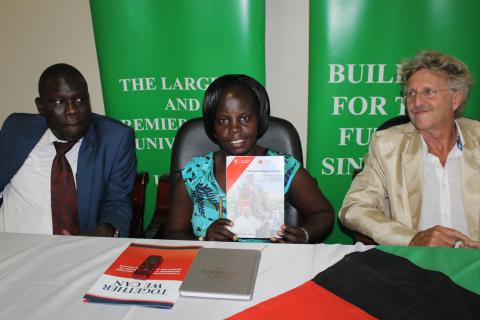Mak unfair to diploma, mature-age entrants - Research
Submitted by Christopher Tusiime on

A research carried out by Dr Peace Buhwamatsiko Tumuheki of Makerere University indicates that policies subjected to those admitted under the diploma and mature-age entry schemes are very constraining and unfair.
Dr Tumuheki, at a research dissemination seminar at Makerere on May 26, said since liberalisation of higher education in Uganda in the early 1990s, many changes have taken place in the education sector, but universities have since given little attention to diploma and mature-age scheme entrants.
Tumuheki said the two categories of students, dubbed non-traditional students (NTSs), especially at Makerere where she carried out her research from, are not properly absorbed into the education system. She said most of them join when they are already workers but universities never consider the work experience skills they possess.
She says these students are non-traditional because before the liberalization of education, university education was only restricted to direct-entry students who were senior six leavers; she calls these ‘traditional students’.
“Universities must know that it is not business as usual. Things have changed. They have to recognise and appreciate the fact that when they opened their doors to a ‘new public’, their student population acquired a new identity,” Tumuheki said.
At Makerere, when applying, the diploma and mature-age entry hopefuls are asked to only make one choice with an assumption that they already know what they want, while their counterparts, the S6 leavers, fill six choices on the same application forms.
This, Tumuheki argues, is very unfair. “When they [NTSs] ask for more forms so as to increase their chances of getting admitted, they are asked to pay more money. They are not even allowed to apply using the online system,” she says, recommending that that should be changed immediately.
Dr Alex Okot from the department of Adult and Community Education at Makerere, was the main discussant. He expressed his concern about the little time lecturers give to non-traditional students.
“We admit these students but tell [our] lecturers that after 5pm, you are free to leave your offices and go home. Is that fair? These students are working and the only time they have to meet lecturers, inquire about missing exams, and clarification about class work is after 5pm. So, do universities consider these issues?” Okot wondered.
Dr Okot also said it is unfair that these students, once admitted, are not allowed to change their programs.
RESTRUCTURE UNIVERSITY EDUCATION
Okot said time is due for universities in Uganda to restructure their courses, and review their syllabi so as to cope with the fast-changing technology and globalisation needs.
“We have structural problems in terms of staff and courses. There should be a mechanism in place that facilitates direct-entry students to learn from NTSs because they have [valuable] experience. Many may be working already but we ignore that,” Okot said.
To ensure that the graduates are meeting the requirements in the job markets, Okot also suggested the need to bring employers into the education system.
“We have excluded employers from education. We are like, employers be that side, let us [university lecturers] teach and after, we shall send them to you. And what happens is that when we send them, we are told they are half-baked... Field attachment alone is not enough. That philosophy of [they do internship] is the one that has destroyed us,” Okot said.
“The system is marginalising these students. For example, in lecture rooms, lecturers don’t consider their experience obtained from their previous workplaces and what happens is that these students end up losing interest in studies because they don’t relate with the practicals they know,” Tumuheki said.
RECOMMENDATIONS
The research, which was based on the argument that opening and increasing access for NTSs to education alone is not a sufficient effort in achieving inclusive and equitable quality education for all, was conducted with an aim of understanding the experiences and participation needs of NTSs and to contribute towards enabling their meaningful participation in university education.
Tumuheki made several recommendations to the government, the National Council for Higher Education (NCHE) and administrators of different universities. They included review of universities’ policies so as to enable NTSs enjoy their academic journeys at university level.
The other recommendation was that universities should give first priority to diploma holders and mature-age entrants when considering which students should be on evening program, arguing it is double standards when day and evening programmes get dominated by direct-entry applicants.
tusiime.chris20@gmail.com
- 973 reads
